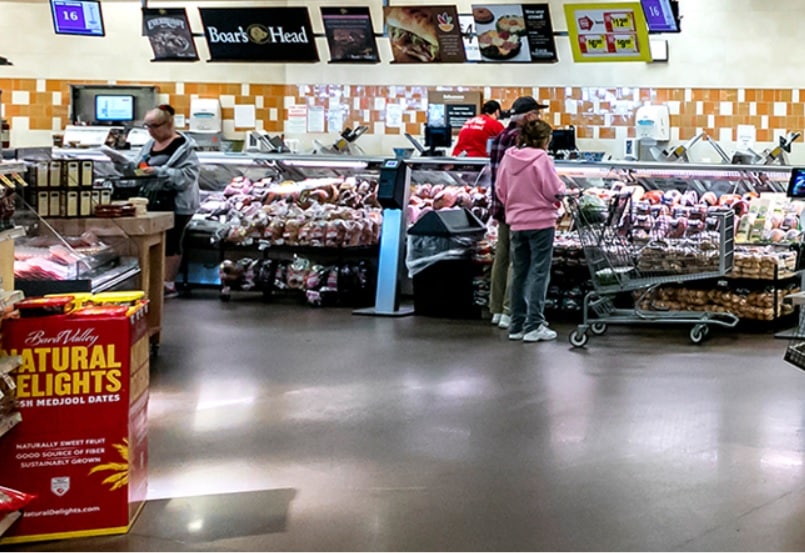
It’s known as the “Poverty Premium” – those with the least amount of money to pay for essential goods and services, often end up having to spend the most for them. But a group of teen community activists in Boston isn’t having it. They’re calling out a local grocery chain for imposing a poverty premium on shoppers in their neighborhood. And the grocery chain’s response? They should buy more items when they’re on sale.
It was nearly a year ago when youth organizers with the Hyde Square Task Force in Boston’s Jamaica Plain neighborhood conducted a price check at their local Stop & Shop, and at a different Stop & Shop in the suburbs. Buying items they would typically choose on a regular grocery run, like yogurt, frozen foods and lunch meat, they paid $194 for a basket of 35 items at the Jamaica Plain Stop & Shop across the street from an inner-city housing complex. Then they traveled about eight miles to the more affluent suburb of Dedham, buying the very same items at a Stop & Shop there, and paying just $160.
That meant they paid 21% more in the city than they did for the very same items in the suburbs. Some items cost even more, like a box of frozen Bubba burgers that cost $4 more in the city, representing a price difference of 22%. Even several store brands had pronounced price differences. A Stop & Shop frozen pizza that cost $5.29 in Dedham was $6.99 in Jamaica Plain – a 24% difference in price.
When the teens publicized their list and reached out to Stop & Shop last spring, the grocery chain complained that the teens’ methods were not scientific. Their shopping list compared less than 1% of the items that the stores sell, Stop & Shop pointed out. If the teens had purchased a more representative sample of products, they would have found that the overall price difference is less – though Stop & Shop didn’t say how much less.
That’s where things stood until last week, when the teens followed up by sending a letter to Stop & Shop, suggesting a way the retailer might address its price disparities. “Since Stop & Shop is making millions from capturing and selling private and personal information of its customers, we would like to respectfully request that Stop & Shop use these profits to create price equity across your chain,” the letter read.
In a response sent to the Boston Globe, Stop & Shop pointed out that the teens “avoided items on sale” when making their purchases. If they had shopped based on what was on sale that week, they would have found little to no difference in prices between the two stores. Regular prices may differ, Stop & Shop acknowledged, but sale prices are the same across the entire chain.
That makes sense, since sale prices are advertised in weekly circulars. And it would be difficult to justify charging different prices at different stores, when those differences are right out in the open, in print, for all to see. So charging the same sale prices to everyone is more a matter of simplicity than equity.
While most of the teens’ purchases were indeed for full-price items, they did actually buy several items that were on sale. And the savings shown on their receipts made the stores’ everyday price differences all the more apparent. A package of frozen fish was on sale for $6 at both stores. But the regular price in Dedham was $6.49, while the regular price in Jamaica Plain was $8.39 – a 29% price difference if they had purchased the product when it wasn’t on sale. A package of lunch meat was on sale for $5, but the regular price of $6.49 in Dedham was far better than the $8.99 in Jamaica Plain – a whopping 39% difference.
So Stop & Shop has a point, in that the teens wouldn’t have experienced such price disparities had they only purchased items that were on sale. But is it fair for the retailer to suggest that lower-income shoppers should only buy items on sale, when higher-income suburban shoppers are free to buy whatever they want at full price, knowing that the full price they’re paying is far lower than what they’d pay in the city?
There are reasons, of course, that prices can vary by location. Some suggest that the “poverty premium” is about corporate greed – retailers can charge more if they have a captive audience without the means to travel outside of their own neighborhood to shop, or they might charge more to shoppers who are more likely to receive government assistance. But other reasons are less nefarious – the cost of doing business in the city is often higher, with more expensive rents to pay, utility costs, labor costs, store security and other factors, that are passed along to shoppers. And a store with higher prices beats having no store in the neighborhood at all, the thinking goes.
So Stop & Shop’s response may have been somewhat inartful, and the teens’ pricing experiment may have failed to recognize market realities. But the bottom line is that those who are less able to afford food, often have to pay more for it. It may not be convenient or realistic to buy only items that are on sale, and doing so doesn’t solve the problem of everyday pricing disparities. But for anyone who wonders whether clipping coupons and shopping for deals is worth it – this pricing dispute may have inadvertently proven that putting in the effort can be worth every penny.
Image source: Stop & Shop
















What are the operating costs in a city compared to a suburb?
Added costs for rent, utilities, maintenance, security?
How much more shrink, theft, crime, risk, is there at an urban store over a suburban one?
And what’s wrong with shopping the sales? Wherever one lives?
“Defunding the police” and soft on crime prosecutors we’ve learned have been massive and foolish mistakes.
Stores of all types have to balance the risks with rewards with all of their locations — they are not social welfare entities — they are profit-making businesses.
The “activists” should be learning the lessons that they have to fairly, accurately, and completely report facts, not opinions. And, if fact, they should be grateful for what they have.
They have no idea how much the grocery company earns from customer data and to make a wholesale statement such as “Since Stop & Shop is making millions from capturing and selling private and personal information of its customers, we would like to respectfully request that Stop & Shop use these profits to create price equity across your chain,” is likely false and certainly is disparaging.
They are lucky they are not being sued for defamation.
I think alot of it has to do with theft and crime in the city. Also, city stores are usually smaller.